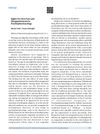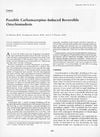 54 citations,
September 2012 in “Dermatologic Clinics”
54 citations,
September 2012 in “Dermatologic Clinics” Some medications can cause hair loss, but stopping the drug usually leads to recovery within 3 months.
 48 citations,
February 2014 in “Fertility and Sterility”
48 citations,
February 2014 in “Fertility and Sterility” Women with PCOS often have hair loss, which is linked to acne or excess body hair but not to worse hormone or metabolic issues.
 12 citations,
July 2019 in “Acta Neurologica Belgica”
12 citations,
July 2019 in “Acta Neurologica Belgica” Levodopa for Parkinson's disease might be linked to skin issues like melanoma, but it's unclear if the drug or the disease causes them.
 3 citations,
June 2014 in “Klinik Psikofarmakoloji Bulteni-bulletin of Clinical Psychopharmacology”
3 citations,
June 2014 in “Klinik Psikofarmakoloji Bulteni-bulletin of Clinical Psychopharmacology” The document concludes that there is hope for future psychopharmacology research despite challenges in treating schizophrenia.
 July 2022 in “International journal of dermatology, venereology and leprosy sciences”
July 2022 in “International journal of dermatology, venereology and leprosy sciences” More frequent and severe skin problems are linked to higher daily alcohol consumption.
 223 citations,
December 2010 in “The Journal of Sexual Medicine”
223 citations,
December 2010 in “The Journal of Sexual Medicine” Some patients taking finasteride or dutasteride may have ongoing sexual problems and depression even after stopping the medication.
 46 citations,
September 2011 in “Journal of Endocrinology”
46 citations,
September 2011 in “Journal of Endocrinology” Natural 5α-reduced glucocorticoids might be anti-inflammatory with fewer side effects than current options.
 35 citations,
October 2012 in “Dermatologic Clinics”
35 citations,
October 2012 in “Dermatologic Clinics” Autoimmune diseases can cause hair loss, and early treatment is important to prevent permanent damage.
 28 citations,
January 2006 in “Journal of agricultural safety and health”
28 citations,
January 2006 in “Journal of agricultural safety and health” Most Latino farmworkers in the study had skin diseases, with fungal infections being the most common.
 28 citations,
October 1998 in “Baillière's clinical endocrinology and metabolism”
28 citations,
October 1998 in “Baillière's clinical endocrinology and metabolism” Testosterone replacement may help post-menopausal women with androgen insufficiency, but more research is needed on its benefits and risks.
 24 citations,
March 2010 in “Value in Health”
24 citations,
March 2010 in “Value in Health” The PCOS-specific questionnaire needs more work to fully measure quality of life in clinical trials.
 20 citations,
January 2012 in “International journal of trichology”
20 citations,
January 2012 in “International journal of trichology” Steroids are the best treatment for Alopecia Areata with few side effects.
 18 citations,
October 1984 in “International Journal of Dermatology”
18 citations,
October 1984 in “International Journal of Dermatology” Lithium therapy may cause temporary hair loss, with possible regrowth if treatment is stopped or continued.
 17 citations,
January 2013 in “Indian Journal of Pharmacology”
17 citations,
January 2013 in “Indian Journal of Pharmacology” High levels of the seizure medication sodium valproate can cause hair loss.
 16 citations,
September 2015 in “Journal of Ethnopharmacology”
16 citations,
September 2015 in “Journal of Ethnopharmacology” The document concludes that "Dictamnus" has a rich cultural history and potential as a herbal medicine, warranting more research into its effects and safety.
 15 citations,
April 2007 in “Journal of child neurology”
15 citations,
April 2007 in “Journal of child neurology” An 11-month-old boy with Menkes disease had severe brain shrinkage and abnormal blood vessels, and didn't respond well to treatment.
 14 citations,
October 1977 in “The Lancet”
14 citations,
October 1977 in “The Lancet”  14 citations,
October 2006 in “Journal of The American Academy of Dermatology”
14 citations,
October 2006 in “Journal of The American Academy of Dermatology” A woman with Parkinson's disease experienced hair loss from the Parkinson's medication pramipexole, which improved after stopping the drug.
 13 citations,
September 1989 in “International Journal of Dermatology”
13 citations,
September 1989 in “International Journal of Dermatology” Carbamazepine may cause reversible nail detachment.
 12 citations,
October 2004 in “Experimental Gerontology”
12 citations,
October 2004 in “Experimental Gerontology” Changes in testosterone and estrogen receptor genes can affect how men age, influencing body fat, hair patterns, and possibly leading to skin disorders.
 10 citations,
October 2017 in “Archivos Argentinos De Pediatria”
10 citations,
October 2017 in “Archivos Argentinos De Pediatria” Most hospitalized children with skin issues were boys, with allergic skin diseases like atopic dermatitis being most common, and treatments were usually topical.
 6 citations,
June 2021 in “Journal of health psychology”
6 citations,
June 2021 in “Journal of health psychology” The article suggests that the view of male baldness as a medical issue is influenced by commercial bias and calls for more unbiased research.
 6 citations,
November 2007 in “Archives of Disease in Childhood: Education & Practice”
6 citations,
November 2007 in “Archives of Disease in Childhood: Education & Practice” The document concludes that accurate diagnosis of alopecia in children relies on thorough examination and history, and while treatments exist, none can alter the course of alopecia areata, which can significantly affect a child's psychological well-being.
 2 citations,
March 2004 in “Reviews in Gynaecological Practice”
2 citations,
March 2004 in “Reviews in Gynaecological Practice” Hormonal changes and psychological issues can cause sexual dysfunction in postmenopausal women. Behavioral therapy is recommended first, with hormone replacement helping some symptoms but not libido. Testosterone can improve libido, but its effects on overall sexual function are unclear. Emotional and relationship issues should be addressed before using medication, and the benefits and risks of testosterone supplementation should be considered.
 1 citations,
August 2023 in “Frontiers in immunology”
1 citations,
August 2023 in “Frontiers in immunology” Traditional Chinese medicinal foods may help manage long-term post-COVID symptoms.
 June 2024 in “Archives of dermatological research”
June 2024 in “Archives of dermatological research” Dietary supplements might help prevent post-COVID hair loss, but serum ferritin is not a reliable indicator.
 September 2023 in “International journal of medicine”
September 2023 in “International journal of medicine” AI is revolutionizing healthcare by improving diagnosis, treatment, and monitoring, but still needs close supervision.
 August 2020 in “The American Journal of Cosmetic Surgery”
August 2020 in “The American Journal of Cosmetic Surgery” Hair transplant surgery significantly reduces anxiety in balding patients, especially those under 30 years old.

The article concludes that understanding the causes of hair loss and using continuous treatments like minoxidil and finasteride can help manage it, despite potential side effects.

AI-assisted surgical robots improve surgery precision and safety.






























